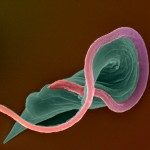Link to Pubmed [PMID] – 35450294
Link to DOI – 10.3389/fcell.2022.851475
Front Cell Dev Biol 2022 ; 10(): 851475
The Trypanosoma (T) brucei life cycle alternates between the tsetse fly vector and the mammalian host. In the insect, T. brucei undergoes several developmental stages until it reaches the salivary gland and differentiates into the metacyclic form, which is capable of infecting the next mammalian host. Mammalian infectivity is dependent on expression of the metacyclic variant surface glycoprotein genes as the cells develop into mature metacyclics. The VEX complex is essential for monoallelic variant surface glycoprotein expression in T. brucei bloodstream form, however, initiation of expression of the surface proteins genes during metacyclic differentiation is poorly understood. To better understand the transition to mature metacyclics and the control of metacyclic variant surface glycoprotein expression we examined the role of VEX1 in this process. We show that modulating VEX1 expression leads to a dysregulation of variant surface glycoprotein expression during metacyclogenesis, and that following both in vivo and in vitro metacyclic differentiation VEX1 relocalises from multiple nuclear foci in procyclic cells to one to two distinct nuclear foci in metacyclic cells – a pattern like the one seen in mammalian infective bloodstream forms. Our data suggest a role for VEX1 in the metacyclic differentiation process and their capacity to become infectious to the mammalian host.






